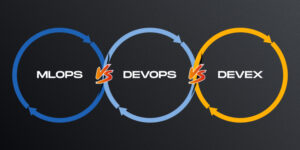
Are you keen to venture on an exhilarating expedition into DevOps? Brace yourself for a captivating exploration of this revolutionary approach that merges development and operations. Picture a seamless dance between software engineers and IT operations professionals, working hand in hand to deliver cutting-edge products with lightning speed and unwavering quality.
In this ultimate overview and guide, we’ll demystify DevOps, uncover its core principles, and delve into its transformative power. From continuous integration and deployment to automated testing and beyond, we’ll navigate the captivating landscape of DevOps, empowering you with the knowledge to conquer the digital realm like never before. Let’s dive in!
What is DevOps
DevOps, a dynamic and transformative approach, embodies the fusion of development and operations in software delivery. It encapsulates a philosophy that promotes collaboration, efficiency, and continuous improvement. DevOps fills the void between traditionally siloed teams, allowing seamless communication and alignment. It emphasizes automation, leveraging cutting-edge tools and technologies to streamline workflows and eliminate manual bottlenecks.
By embracing DevOps, organizations can achieve accelerated time-to-market, enhanced software quality, and improved customer satisfaction. A collaborative, shared, and innovative culture empowers teams to deliver remarkable results. DevOps is the driving force behind the evolution of modern software development and deployment practices.
Definition and Core Principles of DevOps
In the realm of DevOps, understanding its definition and core principles is like unraveling the threads of a captivating tale. DevOps, at its essence, is a philosophy that harmonizes development and operations, fueling collaboration and driving innovation. It embodies a set of guiding principles, such as automation, continuous integration, and feedback loops, which ensure agility and efficiency throughout the software delivery lifecycle.
To truly appreciate the significance of DevOps, we must explore its evolution and historical context. Born out of the need to bridge the gap between developers and operations teams, DevOps is a response to traditional methodologies. It draws inspiration from Lean and Agile practices and the pioneering spirit of the open-source community.
Evolution and Historical Context of DevOps
The DevOps journey began with recognizing that collaboration and shared responsibilities are pivotal to delivering high-quality software at scale. Over time, DevOps has evolved, incorporating new technologies, tools, and cultural shifts. It has transcended organizational boundaries and become an enterprising energy in the digital transformation of companies worldwide.
Embracing DevOps is not merely adopting a set of practices—it signifies a mindset shift that fosters collaboration, continuous learning, and a focus on delivering value to end users. By exploring DevOps’s evolution and historical context, we gain a deeper appreciation for its transformative power and its potential to revolutionize software development for years to come.
What Problems Does DevOps Solve
DevOps emerges as a powerful problem-solving force, tackling critical challenges in the software development realm. It eradicates silos, promoting collaboration and streamlined workflows. DevOps resolves the age-old problem of slow and error-prone software releases by automating processes and implementing continuous integration and deployment.
It leverages cloud technologies and infrastructure as code practices to conquer scalability hurdles, enabling organizations to adapt effortlessly to growing demands. DevOps also ensures exceptional software quality through automated testing, monitoring, and feedback loops. DevOps revolutionizes organizations into agile, efficient, and customer-focused entities. It’s the superhero solution that breathes life into software development, solving problems and driving success.
What are the Benefits of DevOps
Embracing DevOps bestows myriad benefits upon organizations, acting as a stimulus for digital transformation and company success. Firstly, it accelerates time-to-market, enabling rapid and frequent software releases, giving organizations a competitive edge. DevOps promotes collaboration and communication, breaking down silos and promoting teamwork. Automating processes enhances efficiency, reducing manual errors and releasing helpful time for creation.
Software stability and dependability soar as automated testing and continuous monitoring ensure software stability. DevOps also boosts scalability, leveraging cloud technologies and infrastructure-as-code practices. Lastly, it cultivates a culture of learning and improvement, driving innovation and empowering teams to deliver exceptional customer experiences.
RELATED POSTS:
- 10 Significant Benefits of DevOps for Business Growth
- Top 10 Key Advantages of Artificial Intelligence In DevOps
What are the Challenges of Adopting DevOps
While the benefits of adopting DevOps are undeniable, organizations may encounter certain challenges along their DevOps journey. Firstly, cultural resistance can impede the adoption process, as it requires a shift in mindset and collaboration across teams. Legacy systems and technical debt can pose obstacles, requiring careful planning and strategies for migration and modernization.
Skill gaps and training needs may arise, necessitating upskilling or hiring efforts. Maintaining security and compliance standards throughout the DevOps pipeline is also a challenge that requires careful attention. Lastly, managing the complexity of interconnected tools and technologies demands robust governance and integration practices. Organizations can pave the way for successful DevOps implementation by recognizing and addressing these challenges.
Why DevOps Matters
DevOps matters because it holds the key to unlocking the full potential of organizations in the digital era. In today’s competitive environment, the ability to deliver high-quality software rapidly is paramount. DevOps enables precisely that by breaking down barriers between teams, fostering collaboration, and aligning goals.
It empowers organizations to respond swiftly to market demands, adapt to changing customer needs, and stay ahead of the curve. Moreover, DevOps fosters a culture of innovation, continuous learning, and improvement, nurturing employee engagement and satisfaction. Ultimately, DevOps matters because it drives business agility, customer satisfaction, and long-term success in our technology-driven world.
DevOps Skills
Mastering the art of DevOps requires a skill set that blends technical prowess with an innate understanding of collaboration and automation. Here, we delve into the essential DevOps skills that set professionals apart in this dynamic field.
- Proficiency in scripting and programming languages like Python, Ruby, or PowerShell.
- Expertise in configuration management tools such as Ansible, Chef, or Puppet.
- Strong grasp of cloud platforms and technologies like AWS, Azure, or Google Cloud.
- Deep understanding of containerization frameworks like Docker and orchestration tools like Kubernetes.
- Familiarity with version control systems like Git for efficient code management and collaboration.
- Familiarity with CI/CD pipelines and the ability to implement automated build, test, and deployment processes.
- Aptitude for infrastructure as code (IaC) tools like Terraform or CloudFormation.
- Proficiency in monitoring and logging tools to ensure system health and performance.
- Strong problem-solving and troubleshooting skills to identify and resolve issues swiftly.
- Excellent communication and collaboration abilities to work seamlessly across teams and bridge gaps between developers, operations, and other stakeholders.
Remember, mastering these DevOps skills requires continuous learning, staying updated with emerging technologies, and actively seeking opportunities to apply them in real-world scenarios. The perfect blend of technical finesse and interpersonal acumen propels DevOps professionals to new heights of success.
DevOps Methodologies, Principals, and Strategies
DevOps methodologies, principles, and strategies form the bedrock of this transformative approach to software development. At its core, DevOps embraces a culture of collaboration, agility, and continuous improvement. It champions methodologies like Continuous Integration (CI) and Continuous Deployment (CD), enabling teams to seamlessly integrate code changes and deploy them to production swiftly and reliably. Infrastructure as Code (IaC) is another critical principle, allowing infrastructure provisioning and configuration through code.
Furthermore, DevOps strategies encompass automated testing, monitoring, and feedback loops to ensure quality and performance. It also emphasizes using version control, containerization, and microservices architecture to foster scalability and flexibility. With these methodologies, principles, and strategies, DevOps empowers organizations to deliver software faster, with enhanced quality and responsiveness.
Also Read: Key Differences Between Agile and DevOps Methodologies
DevOps tools
In the DevOps landscape, many tools empower organizations to streamline processes, automate tasks, and enhance collaboration. These tools are crucial in accelerating software delivery, from source code management to deployment orchestration. Version control systems like Git enable efficient code collaboration, while CI/CD platforms such as Jenkins and CircleCI automate build, test, and deployment workflows.
Configuration management tools like Ansible and Puppet simplify infrastructure provisioning and management. Containerization platforms like Docker and orchestration tools like Kubernetes revolutionize application deployment and scalability. Monitoring and logging tools like Prometheus and ELK stack ensure system health and performance. These DevOps tools, each with unique capabilities, equip organizations with the technological prowess to achieve their goals efficiently and effectively.
RELATED POSTS:
- CI/CD Vs DevOps: Understanding 10 Key Differences
- How DevOps Can Help with Cloud Migration and Management
Implementing DevOps
Implementing DevOps in an organization requires a thoughtful and strategic approach. Firstly, fostering a culture of collaboration and shared responsibility is crucial. Encouraging open communication and providing cross-functional training paves the way for successful adoption. Additionally, identifying key stakeholders and obtaining their support helps overcome resistance to change.
When facing challenges and common pitfalls, it’s essential to prioritize incremental progress, focusing on small wins to build momentum. Embracing automation and standardization minimizes manual errors and promotes consistency. Regularly evaluating and adjusting processes ensures continuous improvement. Ultimately, successful DevOps implementation relies on combining technical expertise, cultural transformation, and a commitment to embracing change for the better.
DevOps Culture and Collaboration
DevOps culture and collaboration lie at the heart of its transformative power. Organizational silos must be broken down as the first step, encouraging cross-functional teams to work together seamlessly. By fostering collaboration and open communication, DevOps fuels innovation and creative problem-solving. Embracing a continuous learning and improvement culture is vital, encouraging individuals to embrace new technologies, share knowledge, and embrace feedback.
It cultivates an environment where mistakes are treated as learning opportunities and encourages experimentation and growth. In this culture, teams are empowered to take ownership, collaborate on shared goals, and collectively drive organizational success, fueling a vibrant and dynamic ecosystem of collaboration and innovation.
DevOps in Action: Real-world Examples
Real-world examples demonstrate the tangible impact of
DevOps on organizations across various industries. In case studies, we witness how organizations like Netflix leverage DevOps practices to achieve remarkable success. Adopting a DevOps mindset, they embrace continuous integration, deployment, and testing, enabling them to release new features and updates seamlessly, leading to improved customer experiences and higher user satisfaction.
Successful DevOps transformations have revolutionized organizations like Amazon and Etsy, streamlining their software delivery processes. They achieve faster time to market, reduced deployment failures, and enhanced operational efficiency through automation and collaboration. These transformations also empower teams, fostering a culture of innovation and agility, which drives increased revenue and competitive advantage.
These real-world examples serve as inspiration, showcasing the immense potential and tangible benefits of embracing DevOps principles and practices.
Future of DevOps
The future of DevOps shines brightly with emerging trends and technologies shaping its landscape. Firstly, the rise of Artificial Intelligence and Machine Learning holds excellent promise, enabling intelligent automation and data-driven decision-making in DevOps processes. Cloud-native development is another frontier, as DevOps aligns seamlessly with cloud platforms, enabling scalable, resilient, and containerized architectures.
Moreover, DevOps principles extend beyond software development, with continuous integration and delivery finding application in diverse domains like IoT, infrastructure management, and non-technical sectors. As DevOps continues to evolve, it will further integrate with emerging technologies, enabling organizations to harness their full potential and propel themselves toward unprecedented efficiency, agility, and innovation.
In conclusion, DevOps is a transformative force that unifies development and operations, revolutionizing the software development landscape. It empowers organizations to break down silos, foster collaboration, and deliver high-quality software acceleratedly. DevOps isn’t just a set of tools and practices; it’s a culture, mindset, and philosophy that drives innovation and continuous improvement.
By embracing DevOps, organizations can enhance their agility, responsiveness, and customer satisfaction. It’s a journey that requires commitment, adaptability, and a passion for learning. With this ultimate overview and guide, you’re equipped with the knowledge to embark on your own DevOps expedition and unlock the boundless potential of your organization.






